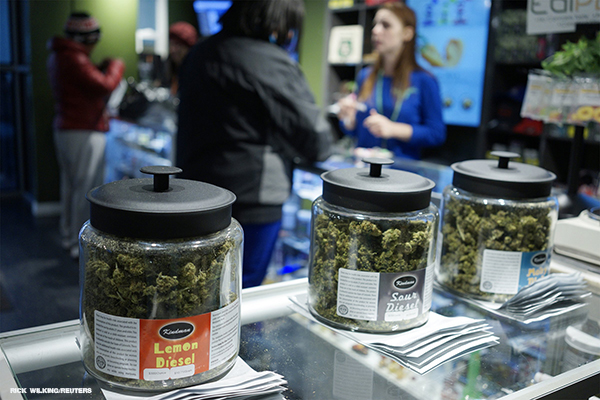Conference Report: The State of Marijuana, California Style

A historic State of Marijuana conference was held Sept. 26–27 onboard the Queen Mary, the former luxury liner and warship that’s now docked at Long Beach harbor in California. The aim, according to organizer Susan Soares, was to cover politics and business on the eve of California’s pending vote on Prop 64 to legalize adult use of marijuana in the state.
“My hope is that the industry can demonstrate a form of conscious capitalism,” Soares told NPR. “You can’t create smart policy if you don’t understand what it is that you’re regulating.”
Among those greeting attendees to the conference was Long Beach city councilwoman Jeannine Pearce, a Texas native who said she’d first tried marijuana when her mother, a medical user, gave it to her to help with her menstrual cramps. (You could almost hear Queen Victoria tipping her teacup at that.)
During the opening plenary session, Harborside Health Center’s Steve DeAngelo welcomed the “new wave of professionals” into the industry while reminding us of the sacrifices that had been made by “legacy” businesses. “It’s time for industry to step up for human rights,” he said, pointedly.
In his day-one keynote, Drug Policy Alliance Executive Director Ethan Nadelmann observed, “We’re now entering the second generation of drug reform, from Prop 215 to now. We’ve hit a turning point, but it’s like turning around an ocean liner. I’ve never actually said that on an ocean liner before.”
The California adult-use market will more than double the size of the four currently legal states, and if the Prop 64 is successful, it will reverberate globally, Nadelmann predicted. NCIA Executive Director Aaron Smith added that if all five adult-use measures pass on Nov. 8, more than 100 Congress reps will hail from legal states.
California’s Special Issues
ArcView Group CEO Troy Dayton, whose keynote kicked off day two, stated that in California and other states where licensing is more open than in Canada and the Northeast, opportunity tends to be in product development and suggested that’s why there is so much investment in California brands.
Mary Shapiro of Evoke Law in San Francisco, however, reminded the crowd that California’s Secretary of State Alex Padilla interprets the law to mean that cannabis products cannot be trademarked, unlike in other states. Because of California’s CEQA and OSHA requirements, the lack of trademark protection, and high prices for land, utilities and water, tax expert Matthew Portnoff advised attendees to look to other states, especially Oregon.
Michael Stevenson of Horizon Water and Environment, who’s conducting an Environmental Impact Review for cannabis in California (the first state to do so), said local standards will have to sync with the minimum environmental standards established by the state. “There’s a chicken or egg happening, because locals want to have things up and running,” he informed. The state plans to start circulating its draft proposals early next year for three input periods.
Assemblyman Reggie Jones-Sawyer (D–Los Angeles), one of the authors of the state’s medical marijuana regulations that passed last year, didn’t hold back when he explained: “I plan to personally work with all the people involved so that they regulations are not onerous. We want to make sure it’s the next best thing to sliced bread, and we want to put Oregon and Colorado out of business. I hope our next President, she will be able to make the changes that we need. We don’t want them to reschedule, we want them to deschedule.”
Surprise guest, Congressman Dana Rohrabacher (R–CA), came wearing a hat that read, “Make Cannabis Great Again.” Rohrabacher said he talked to “Don Trump,” who “has told me and others if the states legalize he won’t interfere. But of course with Don you never know.”
The Evolution of a Revolution
The “Evolution of Pot” panel featured Jeff Raber of The Werc Shop, who called for standardization of the medical market: “Let’s maximize diversity and terpine profiles accelerated with modern analysis. It’s a flexible plant: if we bred this way we can breed it the other way.”
Another panelist, Swami Chaitanya, who lives on a 190-acre farm in Mendocino, described the underground cannabis community as “wizards like in Harry Potter, with this sacred knowledge. Now we’re sharing it with the Muggles.”
Many speakers lamented the disappearance of sweet-smelling heirloom varieties, which have lost out to market pressures for higher yields, maximum THC, and selection of less fragrant strains due to nosy neighbors or law enforcement officials. Longtime grow book author Mel Frank revealed he had about 200 landraces in the late ’70s, but lost nearly all of them “in a legal thing,” adding: “It’s mythical that there was nothing really strong back then.”
Cultivation consultant David Holmes of Clade9 opined that while sun-grown marijuana will be a market of its own, indoor could lose out to its greenhouse competition. He added that it’s difficult to produce quality cannabis in 30,000 sq. ft. grow facilities, especially with investors who want to rush to harvest.
The conference ended with a panel on Prop 64. While Drug Policy Alliance’s Manager of Marijuana Law and Policy Amanda Reiman highlighted the human rights advantages to the proposal, Hezekiah Allen of the California Grower’s Association (CGA) countered: “Big ups to DPA on the human justice component. They just forgot the economic justice.” CGA is officially neutral on the measure due to concerns about the lack of protection against full vertical integration and limits on the acreage that can be cultivated. California NORML has presented a list of proposed legislative fixes to the measure to advance human rights and protect the cottage industry.
Dayton highlighted cannabis businesses that have donated $100,000 or more to reform efforts. The list includes Weedmaps, Dixie Elixirs, Dr. Bronner’s, Advanced Nutrients and MedMen.
 “Cannabis is cause marketing,” Dayton said. “It’s hard to conduct business when you’re not one of the people contributing to the cause. There are tens of thousands of people in prison counting on us to get this right, and not let our petty disagreements get in the way of getting them out of jail.”
“Cannabis is cause marketing,” Dayton said. “It’s hard to conduct business when you’re not one of the people contributing to the cause. There are tens of thousands of people in prison counting on us to get this right, and not let our petty disagreements get in the way of getting them out of jail.”
If you enjoyed this Freedom Leaf article, consider subscribing today!

